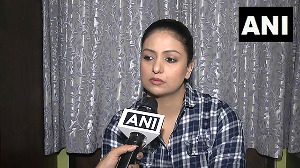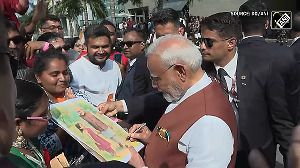A fast-track court, which acquitted all the six accused in the alleged rape of an American student of Tata Institute of Social Sciences in Mumbai last year, has observed that the victim was never raped and no 'sexual intercourse' took place.
The court at Sewree had acquitted the accused, all students, on October 6 for lack of evidence. A detailed copy of the judgment was made available to the lawyers on Tuesday.
The court's observations that the victim was never raped and no 'sexual intercourse' took place were noted in the 100-page document.
It described the 23-year-old victim's statements as 'neither wholly reliable nor wholly unreliable.' The case dates back to April 12, 2009 when, according to police, six friends -- Vinamra Soni (23), Harshvardharn Yadav (22), Jaskaran Singh Bullar (21), Anish Borkatki (21), Dev Colabawala (21) and Kundanraj Bodgohai (22) took the student to a house in Andheri and allegedly gang raped her.
The victim claims that she doesn't remember anything about the incident that took place at the house of one of the accused (Bodgohai). In such a scenario there should be some corroborative, independent or medical evidence. No such evidence is available in this case," the verdict said.
The court further said the victim, who had been out with her friend to meet the boys at Cafe XO bar in Deonar (where TISS is located), was not an invited guest and had just landed at the place without any prior notice.
"So there is no scope of any prior meeting of minds. The victim had gone to the cafe out of her will and was never forced to accompany the boys (accused) to Kundan's house at Andheri," Principle Judge S D Jagmalani noted.
One of the important medical witnesses, Dr Minal Sarmarkar, did not support the prosecution's claim that the victim was drugged with a date-rape drug.
Sarmarkar had testified that the drug's sample was not traced in her urine. The prosecution has to prove its case beyond all reasonable doubts and there can be no presumptions that the victim would always tell the entire story truthfully, the judge observed.
"The victim's testimony falls under the third category -- neither wholly reliable nor wholly unreliable. In this category, court has to circumspect and look for corroboration. Such corroborative evidence were not available in this case," judge noted.
The American student's claim that she had fallen unconscious after the incident was rejected by the court. "The victim had called her friend (Rishabh Choksi) during the time she claimed she was outraged by the accused. The claim that she fell unconscious can not be accepted," the judge added.
It is true that the victim is a foreign national and the court has sympathy towards such foreign citizens but at the same time the court should not ignore basic principles of criminal law, the judge maintained.






